Creatine for Women: Benefits, How to Pick & Take
Author:
Reviewed by:
Unlock your full potential by engaging with our experts and community! Have questions about your fitness journey or looking for expert advice on weightlifting techniques? Don’t hesitate — leave a comment below and Oleksandr Maksymenko will provide a personalized answer and insights to help you reach your goals.
Torokhtiy is reader-supported. Some links are affiliate links, and we may earn a commission at no extra cost to you. See our disclosure page for details.
In the realm of fitness and wellness, the search for optimal supplementation is a never-ending quest. However, when it comes to creatine, the discussion has predominantly revolved around its benefits for men. It’s time to shift the spotlight and shed light on the specific needs of women in this domain.
In this article, we’ll explore everything about creatine for women. From improving strength and lean muscle mass to supporting fitness goals in general, creatine can be a huge plus to your routine. We’ll also let you know how to choose the right kind, how much to take, and when to take it for the best results.
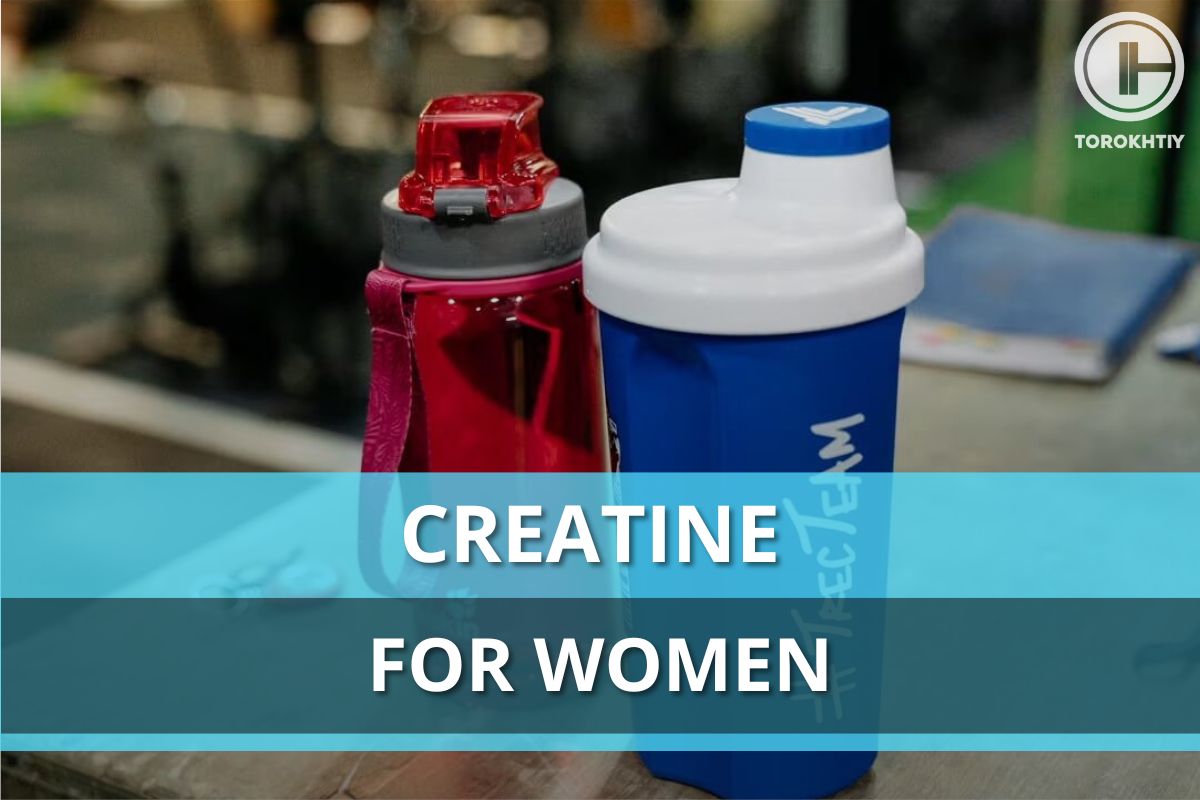
Why Is Creatine Important for Women?
Creatine is important for women because it plays a crucial role in the energy systems of our body, particularly in high-intensity and explosive activities. It is a naturally occurring compound found in small amounts in foods like meat and fish, and it can also be produced by our bodies in limited quantities.
However, supplementing with creatine can significantly increase its availability in the muscles.
What does creatine do for women:
- Creatine has been shown to enhance strength gains and improve power output
- May promote muscle growth and hypertrophy. It can increase the water content within the muscles, creating a more anabolic environment for protein synthesis and muscle repair.
- By providing a readily available energy source, creatine can help delay muscle fatigue and improve overall exercise performance.
- It improves nervous system function and allows the nervous system to cope with overload more easily. It can also be helpful during recovery from injuries such as concussions.
Are muscles, strength, and power important for women? Absolutely! These are precisely the goals that women aim to achieve through strength training. Physiologically, it can be more challenging for women to build muscle, which is why they can benefit from additional support.
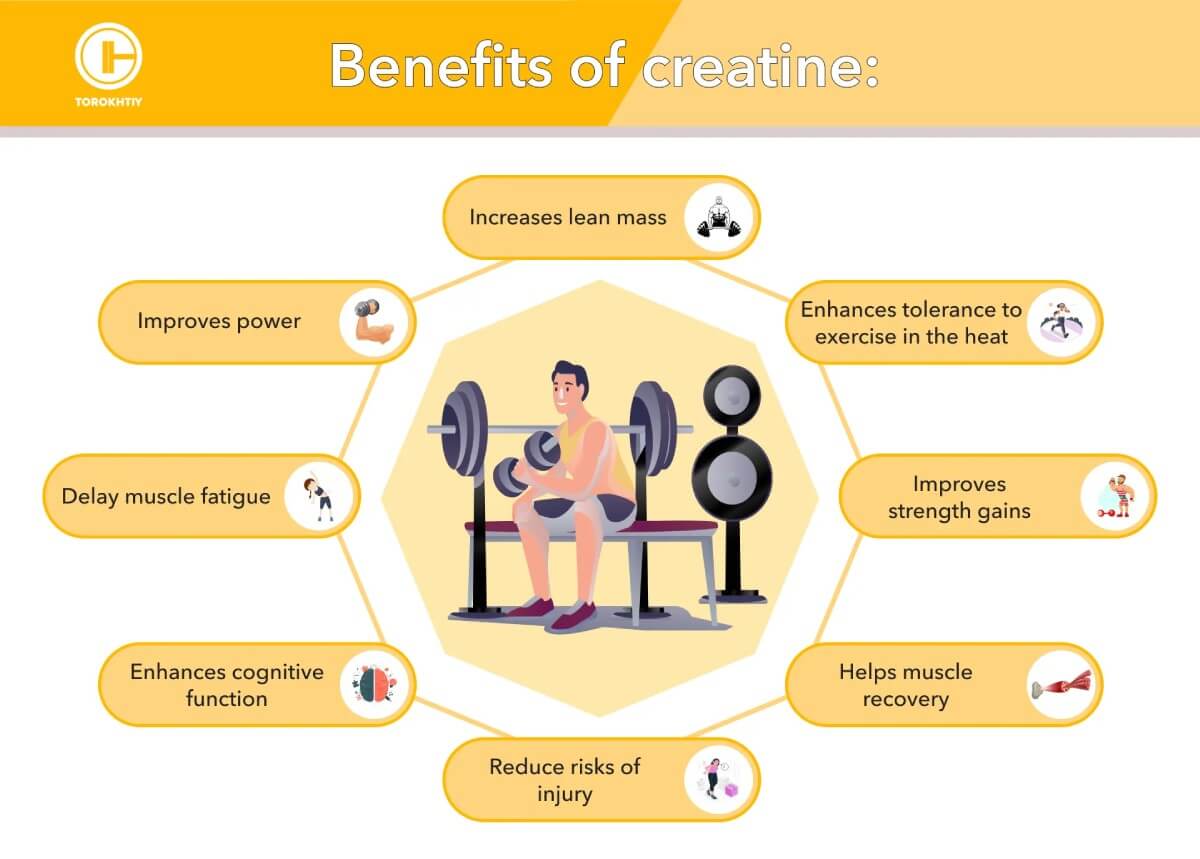
Do Women Respond To Creatine The Same Way As Men?
Studies have shown that both men and women experience an increase in muscle mass and strength when taking creatine. Men often have higher baseline levels of muscle mass and strength due to sex differences, so absolute gains in muscle mass and strength may be greater in men.
However, females exhibiting 70–80% lower endogenous creatine stores compared to males, therefore, both subjective feelings (increased energy, cognitive function, physical performance) and objective results of supplementation (increased strength) may be more pronounced in women.
A similar situation is seen in vegans, who don’t get creatine from fish and meat, so they get more benefit from creatine supplements than people on a mixed diet. Vegan women should definitely experience the effects of creatine for themselves, they will potentially get significant benefits from supplementation.
Creatine can cause water retention in muscle cells, resulting in weight gain. Some women may be concerned about this temporary increase in body weight, which can mask fat loss.
Our expert Tanya Shaiko has some good news for all the women:
“Don’t be afraid of creatine if you are concerned about weight gain. It can cause a slight increase in lean body mass due to increased muscle hydration. But this is not fat gain and is temporary. Focus on the benefits it provides, such as increased energy during intense workouts and better muscle recovery.”
However, keep in mind that weight gain in women is usually smaller due to less muscle mass. While the average weight gain in creatine responders is about 0.5-1 kg, women will be on the lower end of these values. In addition, weight gain is due to water accumulation in the muscles, and therefore does not affect fat tissue or its loss during weight loss.
The optimal creatine dosage may be different for each individual, regardless of gender. Some studies suggest that women may respond to lower doses of creatine compared to men. However, individual responses may vary, so it is important to find the optimal dosage.
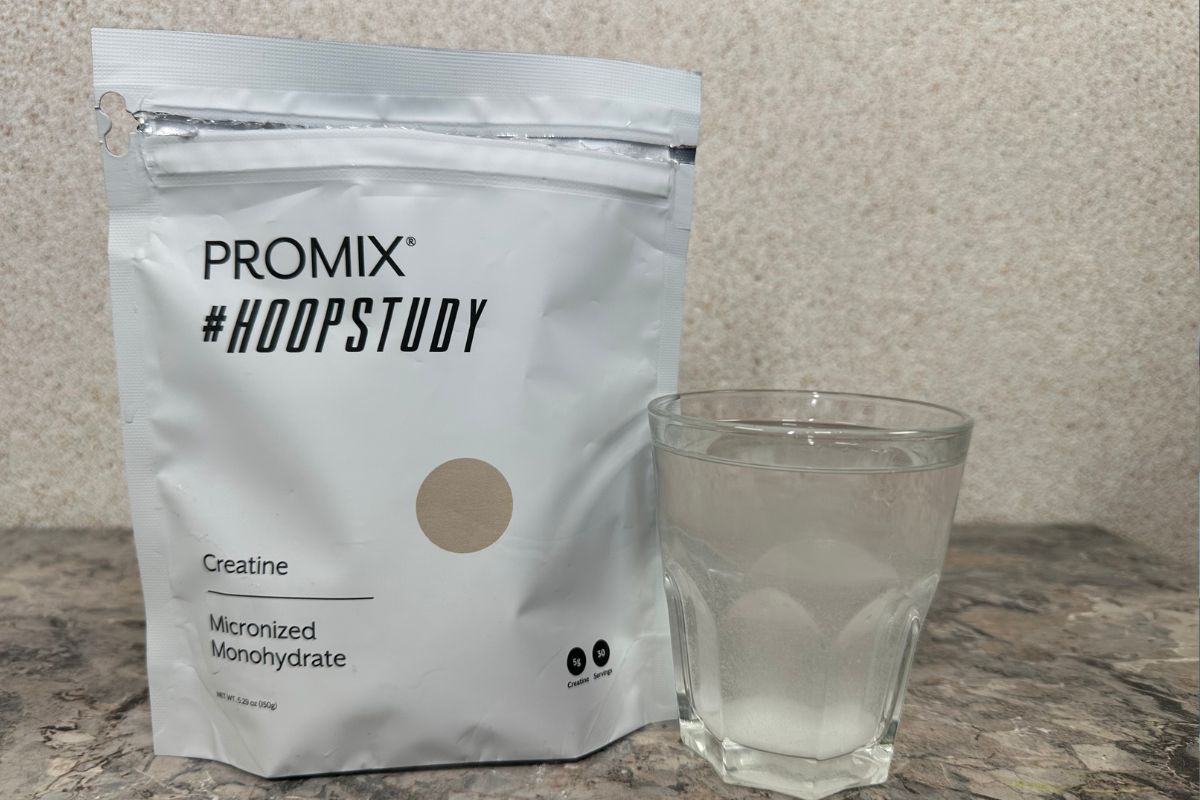
Is Creatine Safe for Women?
Creatine is generally considered safe for women when used appropriately and within recommended dosages. Creatine Monohydrate is the 2nd most researched supplement after caffeine. Numerous studies have examined the safety and efficacy of creatine supplementation in both men and women, and there is no evidence to suggest that it poses specific risks or adverse effects exclusive to women.
Here are some key points to consider regarding the safety of creatine for women:
1. Lack of Gender-Specific Concerns
Research has shown that women can tolerate creatine supplementation well, experiencing similar benefits and side effects as men. Many studies investigating the effects of creatine have included both men and women, demonstrating its safety and effectiveness across genders.
2. Absence of Hormonal Disruptions
Creatine supplementation has not been found to interfere with hormonal balance in women. It does not affect estrogen or progesterone levels, and it does not disrupt the menstrual cycle. Therefore, concerns about hormonal imbalances or feminizing effects are unfounded.
3. Kidney and Liver Health
Some misconceptions suggest that creatine may be harmful to kidney and liver function.
However, numerous studies have shown that creatine supplementation within recommended dosages does not pose a risk to these organs in healthy individuals. Individuals with pre-existing kidney or liver conditions should consult their healthcare provider before using creatine.

4. Adequate Hydration
It is important to maintain proper hydration when using creatine. Adequate fluid intake helps prevent potential side effects such as gastrointestinal distress and cramping. This recommendation applies to both men and women using creatine.
5. Children, Teens, Pregnant and Breastfeeding
While there is limited data on the potential harm of creatine and other sports supplements in specific populations, general recommendations often advise against the use of creatine for girls and adolescents, pregnant and breastfeeding individuals.
Insufficient research has been conducted in these groups to draw definitive conclusions about the safety and efficacy of creatine supplementation.
If you fall into any of these categories and are considering taking supplements, it is crucial to consult your healthcare provider for personalized advice and guidance. They can provide you with the most appropriate recommendations based on your age, condition, and individual circumstances.
6. Quality Of The Supplement
When choosing a women’s creatine supplement, it is crucial to opt for reputable brands that undergo third-party testing to ensure purity and quality. This helps minimize the risk of contaminants or impurities that could potentially pose health concerns.
As with any dietary supplement, it is advisable for women to consult with a healthcare professional, such as a registered dietitian or sports nutritionist, before starting creatine supplementation. They can provide personalized advice based on an individual’s specific health status, goals, and any other medications or supplements they may be taking.
Why Is Creatine Can Be Especially Useful In The Postmenopausal Period?
Postmenopausal women often experience a decline in muscle mass and strength, a condition known as sarcopenia.
Given that creatine helps increase muscle mass and strength, this makes it a valuable supplement to combat age-related loss of muscle mass. By preserving muscle mass and slowing down the rate of sarcopenia, it can improve overall physical health and reduce the risk of falls and fractures which are common in older adults.
Osteoporosis is another major concern for postmenopausal women. Decreased estrogen production and reduced physical activity can lead to decreased bone density, which worsens bone health and leads to an increased risk of fractures.
Maintaining muscle mass and quality through resistance training is one of the keys to preventing osteoporosis, along with eating a diet with adequate protein and calcium. Although creatine itself is unlikely to help strengthen bones, it helps to train harder, maintain muscle mass and indirectly, bone health especially if one regularly engages in resistance training.
Creatine supplementation has been shown to increase brain creatine and phosphocreatine. Studies have shown that taking creatine can have positive effects on cognitive function, such as improving memory or reducing fatigue.
Postmenopausal women may find these cognitive improvements particularly beneficial as they age, as cognitive decline can become a problem later in life.
How to Take a Creatine Supplement?
Common approaches include a short-term loading phase followed by a maintenance phase or a long-term maintenance phase without a loading phase.
The loading phase typically lasts 5-7 days, during which a higher dosage of creatine (around 15-20 grams per day) is taken, followed by a maintenance dose of 3-5 grams per day.
The loading phase has only one advantage – creatine accumulates in the muscles faster. Usually this does not provide any athletic benefits, although it increases the risk of side effects in the form of stomach discomfort.
Therefore, we recommend that you stick to the scheme without the loading phase. When choosing a dosage, keep in mind that women tend to be lighter and less muscular than male athletes, so you can safely stick to a dosage of 3g per day to get all the benefits of creatine intake.
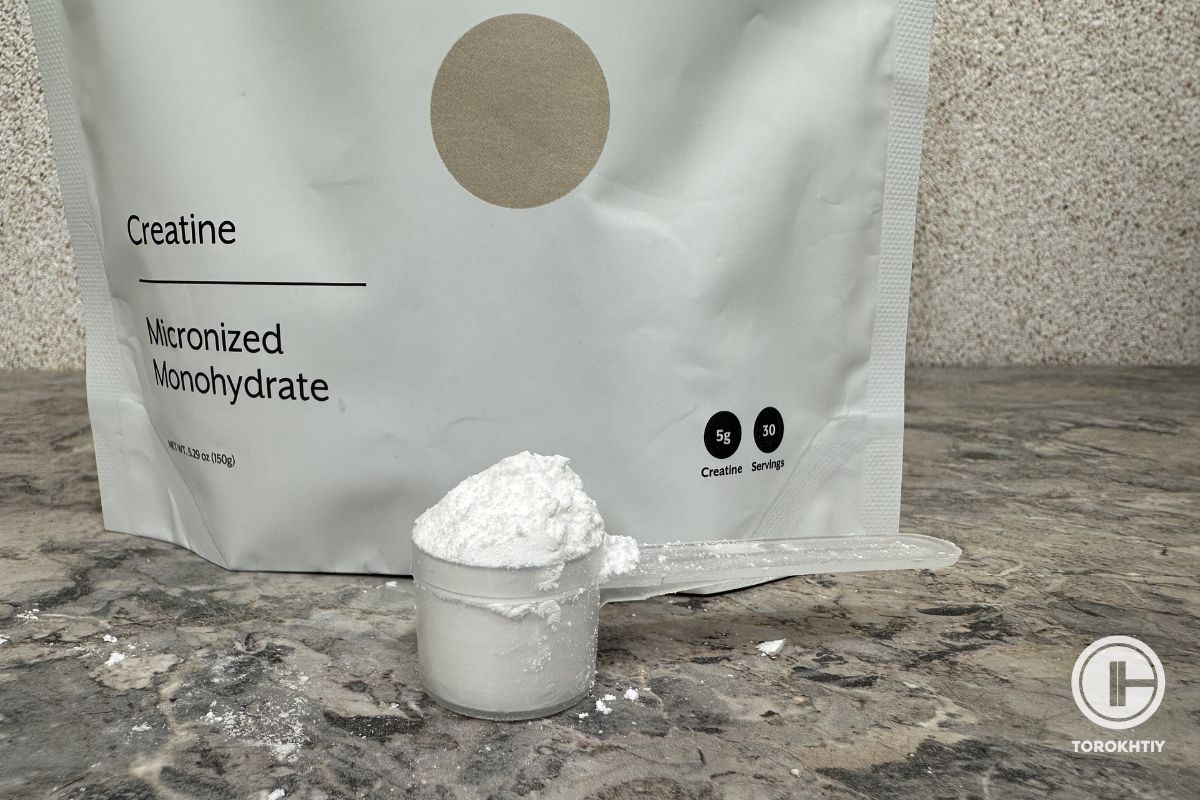
Which Form of Creatine Is Best for Women?
The most widely studied and commonly used form is creatine monohydrate. It is considered safe, effective, and affordable, making it a popular choice among athletes and fitness enthusiasts. Ultimately, if you are looking for a reliable and cost-effective option, creatine monohydrate is the recommended women’s creatine choice.
Other forms of creatine, such as creatine hydrochloride (HCl), have been introduced to address potential issues like solubility or digestive discomfort. However, the scientific evidence supporting their superiority over creatine monohydrate is limited.
While these alternative forms may have their advantages, such as better solubility, they often come at a higher cost.
| Type | Training Effects | Cost | Ease of Use | Flavor | Additional Ingredients |
|---|---|---|---|---|---|
| Creatine Pills | Identical training effects given the same doses | ~$1 per serving | Swallow the required number of capsules with water | Not flavored | Usually no additional Ingredients |
| Creatine Powder | < $1 per serving | Mix a single scoop of creatine in a glass of water and shake well | Unflavored and flavored options | Deluxe creatine supplements feature extra ingredients such as HMB, vitamin D, pre-workout formulas etc. |
Creatine comes in powder or capsule form.
The powder is convenient to use because it dissolves in most liquids, offers options with different flavors, is suitable for vegetarians, and has the best price-to-quality ratio. Capsules are convenient for some consumers to use, although they are more expensive, have smaller portions in the can, often contain gelatin (not suitable for vegans) and still have to be washed down with liquids.
Considering that the effectiveness for capsules and powder is the same, you can choose what you like. But for beginners, we recommend starting with creatine powder.
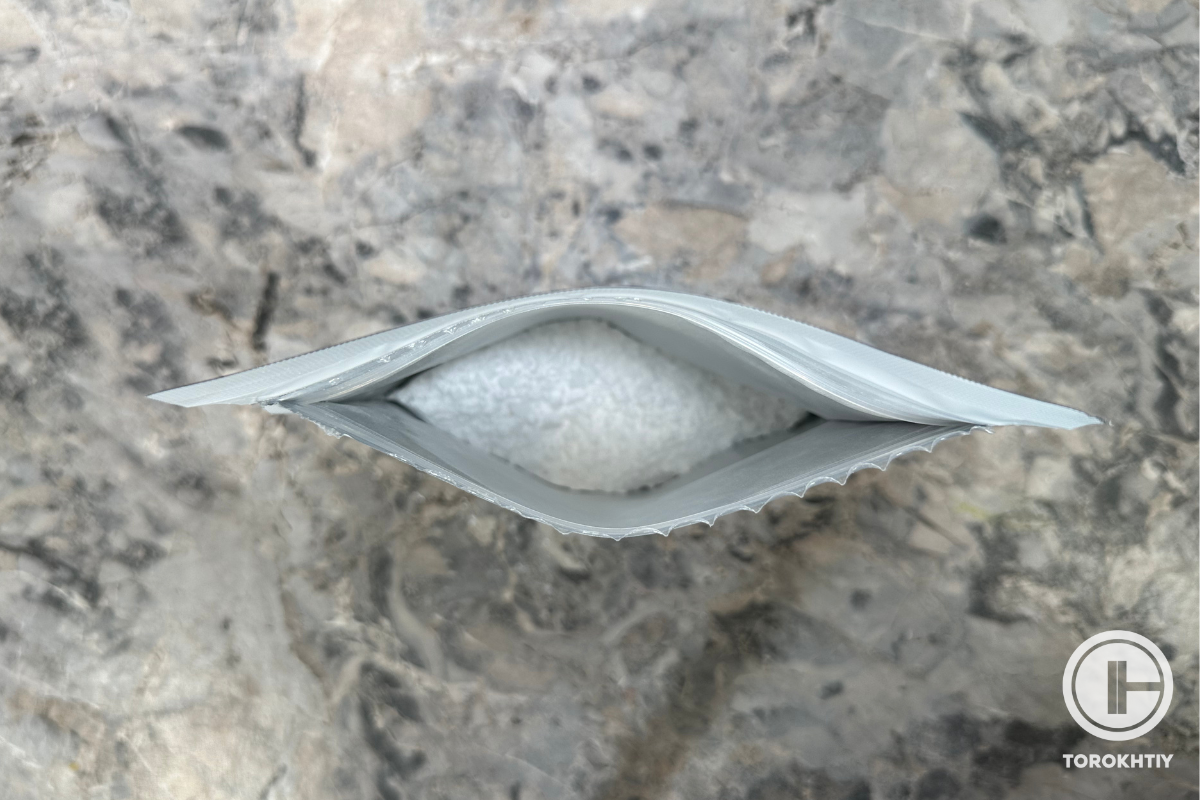
How to Find the Best Creatine for Women?
When looking for the best creatine supplement for women, there are several factors to consider to ensure you choose a product that is safe, effective, and suits your specific needs.
Here are some tips to help you find the best creatine for women:
1. Quality and Reputation
Opt for reputable brands that have a history of producing high-quality supplements. Look for companies that follow good manufacturing practices (GMP) and have their products independently tested for purity and quality.
2. Ingredient Transparency
Choose a creatine supplement that provides clear and transparent information about its ingredients. It should clearly state the type of creatine used (e.g., creatine monohydrate, creatine hydrochloride) and any additional ingredients or additives.
3. Form and Convenience
Creatine is available in various forms, including powders, capsules, and liquids. Consider which form is most convenient for you to take based on your personal preferences and lifestyle. Powders are typically versatile and can be easily mixed with water or other beverages.
4. Price and Value
Consider the price per serving and overall value of the product. While it’s important to invest in a high-quality supplement, compare prices and reviews to ensure you are getting a product that offers good value for money.
5. Customer Reviews and Feedback
Read reviews and testimonials from other users to get an idea of their experiences with different creatine supplements. While individual responses may vary, customer reviews can provide insights into the overall satisfaction and effectiveness of a product.
6. Consult With Professionals
If you’re unsure about which creatine supplement to choose, consider consulting with a healthcare professional, registered dietitian, or sports nutritionist. They can provide personalized recommendations based on your specific needs, goals, and any potential health considerations.
Promix Creatine Micronized
- Form: Powder
- Servings per Container: 180 servings
- Type: Micronized Creatine Monohydrate
- Suitable for Vegans: Yes
- Other Ingredients: None
- Price per Serving (5g): ~$0.29
- Company Founded: 2011
- Recommended by Athletes: Audrey & Nicole Nourse, Odell Beckham Jr, Matthew Noszka
Promix delivers pure micronized creatine monohydrate and nothing else, no flavorings or colorings, aligning with the company’s “no artificial anything” philosophy.
It’s third-party tested for heavy metals and contaminants. Why does it matter? Heavy metals such as lead, mercury, cadmium, and arsenic are known to be toxic to the human body, even at low concentrations they can lead to adverse health effects. The sources of contamination can be the raw materials, the reagents and the solvents used to produce them, the tubing, the equipment and the instrumentation etc.
Next, ease of use. High-quality micronized creatine from Promix is easy to mix, leaving behind no unpleasant chalky taste and reduces the risk of side effects such as bloating.
Each container of Promix Creatine provides an impressive 180 servings (5 g per serving). For muscle saturation with creatine the recommended dose is 3-5 g per day. People with higher lean body mass will need about 5g, but women tend to be a lighter and less muscular part of the population, so even 2.5-3g of creatine a day is an effective dosage.
Using this product is incredibly convenient. Just take ½-1 scoop once a day, without worrying about the timing. Mix it with 8-12 fl oz. of water or your preferred liquid. Simply shake, stir, or blend the mixture for about 30 seconds until the creatine completely dissolves. It’s that simple!
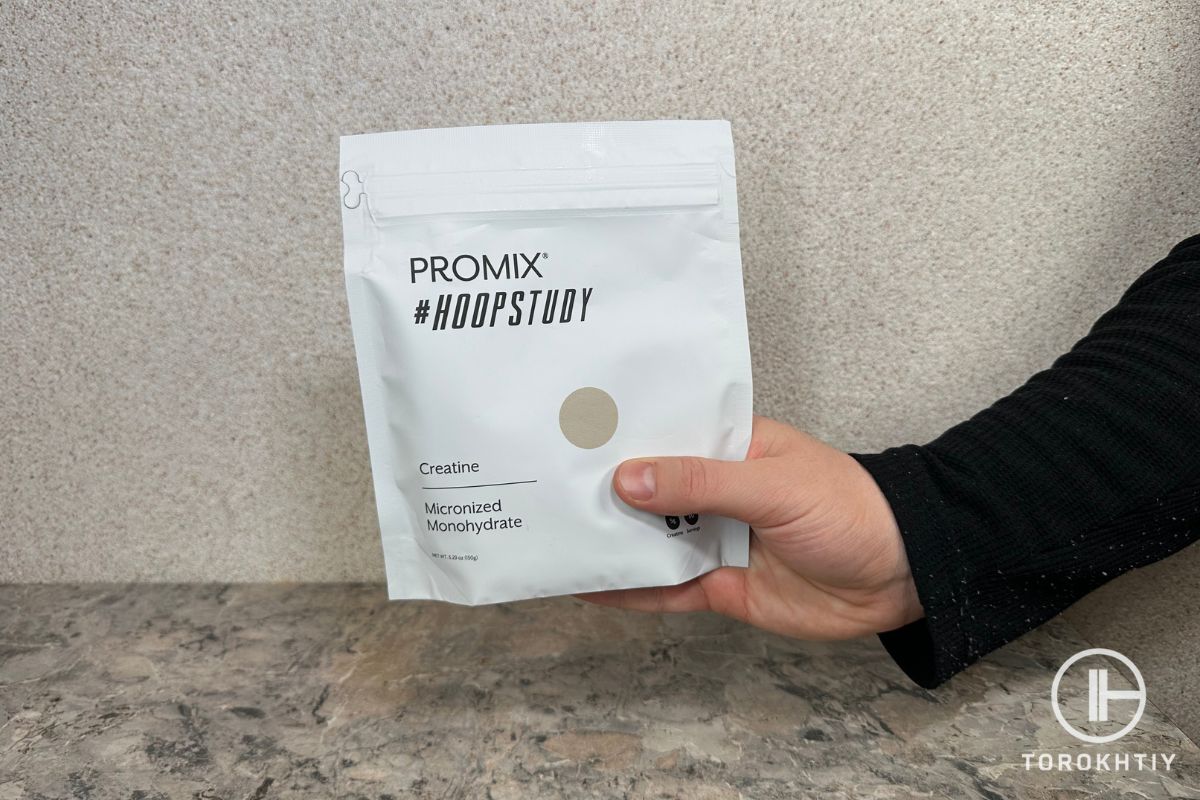
Frequently Asked Questions (FAQs)
Is Creatine Effective For Women?
Yes, creatine has been shown to be effective for women. While much of the research on creatine has focused on male subjects, studies have increasingly included women, demonstrating positive effects in terms of performance, strength gains, and muscle development.
How Long Should Women Take Creatine?
The duration should be determined based on individual preferences, goals, and consultation with healthcare professionals or sports nutritionists. It takes a few weeks to accumulate creatine in the muscles and in the same way after stopping taking it for a few weeks its content gradually goes down to its natural level.
That’s why in most cases creatine is taken long-term (for months or years) or during periods of intense strength training.
Can Creatine Affect Female Fertility?
The effects of creatine supplements for women have been extensively studied, including in both male and female populations, and there is no evidence to indicate a negative impact on fertility in women.
Will I Gain Weight Using Creatine?
Creatine supplementation may lead to a slight increase in body weight due to water retention within the muscles. This weight gain is temporary and not related to an increase in body fat.
On average, individuals may experience a gain of 1-3 pounds (0.5-1.4 kg) during the initial weeks of creatine use. Women tend to have less weight gain due to less muscle mass.
Conclusion
Creatine can be very beneficial for women who are looking to improve their strength, power, and overall fitness performance. If you choose a high-quality creatine supplement, understand the dosage, and incorporate it into a well-rounded fitness routine, you’ll see some amazing results.
Remember to have a word with your doctor before starting to take any supplements, especially if you’re already dealing with a health condition or concern.
If you don’t know what to choose, we highly recommend the Promix Creatine – you get the best quality for the money, third-party tested for heavy metals and contaminants which makes this supplement a safe choice as well.
We really hope that you enjoyed the article. Please feel free to leave a comment, question, or query and one of our experts will get back to you as soon as possible.
Also read:
- Best Creatine for Teens
- Best Creatine at Gnc
- Foods With Creatine
- What Happens When You Stop Taking Creatine
- Does Creatine Make You Gain Weight
- How Much Creatine Should I Take
References:
- Richard B Kreider, “International Society of Sports Nutrition position stand: safety and efficacy of creatine supplementation in exercise, sport, and medicine”, NCBI, https://pubmed.ncbi.nlm.nih.gov/28615996/, (2017 Jun 13)
- Eric S Rawson, Jeff S Volek, “Effects of creatine supplementation and resistance training on muscle strength and weightlifting performance”, NCBI, https://pubmed.ncbi.nlm.nih.gov/14636102/, (2003 Nov)
- Theo Wallimann, Academic Editor, “Creatine Supplementation for Muscle Growth: A Scoping Review of Randomized Clinical Trials from 2012 to 2021”, NCBI, https://www.ncbi.nlm.nih.gov/pmc/articles/PMC8949037/, (2022 Mar)
- Richard B. Kreider, Academic Editor, “Creatine Supplementation and Brain Health”, NCBI, https://www.ncbi.nlm.nih.gov/pmc/articles/PMC7916590/, (2021 Feb)
- Abbie E Smith-Ryan, “Creatine Supplementation in Women’s Health: A Lifespan Perspective”, NCBI, https://www.ncbi.nlm.nih.gov/pmc/articles/PMC7998865/, (2021 March)
- Richard B. Kreider, “International Society of Sports Nutrition position stand: safety and efficacy of creatine supplementation in exercise, sport, and medicine”, Biomedcentral, https://jissn.biomedcentral.com/articles/10.1186/s12970-017-0173-z, (13 June 2017)
- Stacey J Ellery, David W Walker, Hayley Dickinson, “Creatine for women: a review of the relationship between creatine and the reproductive cycle and female-specific benefits of creatine therapy”, NCBI, https://pubmed.ncbi.nlm.nih.gov/26898548/, (2021 Feb)
- Darren G. Candow, “Creatine supplementation for older adults: Focus on sarcopenia, osteoporosis, frailty and Cachexia”, Sciencedirect, https://www.sciencedirect.com/science/article/abs/pii/S8756328222001442, (September 2022)
- Eric S Rawson, “Use of creatine in the elderly and evidence for effects on cognitive function in young and old”, NCBI, https://pubmed.ncbi.nlm.nih.gov/21394604/, (2011 May)
- Geoffrey Casimir, “Lack of Knowledge on the Use and Benefits of Creatine”, Rucore, https://rucore.libraries.rutgers.edu/rutgers-lib/42870/PDF/1/play/, (April 4, 2012)
- Sabrina Moret, “Levels of creatine, organic contaminants and heavy metals in creatine dietary supplements”, ScienceDirect, https://www.sciencedirect.com/science/article/abs/pii/S0308814610016377, (1 June 2011)
- Robert Cooper, “Creatine supplementation with specific view to exercise/sports performance: an update”, NCBI, https://www.ncbi.nlm.nih.gov/pmc/articles/PMC3407788, (Accessed 2012)
- All photos are made by Torokhtiy Media Team.
Why Trust Us?
With over 20 years in Olympic weightlifting, strength training, nutrition coaching, and general fitness our team does its best to provide the audience with ultimate support and meet the needs and requirements of advanced athletes and professional lifters, as well as people who strive to open new opportunities and develop their physical capabilities with us.
By trusting the recommendations of our certified experts in coaching, nutrition, and sports training programming, as well as scientific consultants, and physiotherapists, we provide you with thorough, well-considered, and scientifically proven content. All the information given in the articles concerning workout programming, separate exercises, and athletic performance, in general, is based on verified data.
The product testing process is described in more detail here.
Author: Oleksandr Maksymenko
Certified Sports Nutritionist,
MSc Sports Dietetics
Specializing in: Weight management, Fitness / Sports nutrition
Oleksandr is a professional fitness nutritionist certified by the Fitness Professional Association (FPA). He follows the principles of evidence-based dietetics and fosters a healthy relationship with food in his clients, ensuring there are no strict prohibitions on their favorite foods or frequent lapses. His primary goal is not only to achieve results for you but also to sustain them over the long term, all while enjoying tasty and delicious food.
Reviewed by: Dina Al-Rubaye
Professional Nutritionist and Certified Coach
Personal trainer since 2017
Dina Al-Rubaye, a 26-year-old from Iraq, is a strength and conditioning coach and a sports nutrition specialist. She studied and later earned a degree in Nutrition and Dietetics from the American University of Beirut in Lebanon. She worked in helping people with their diets, but she never let go of her passion for long-distance running and competing in marathons.




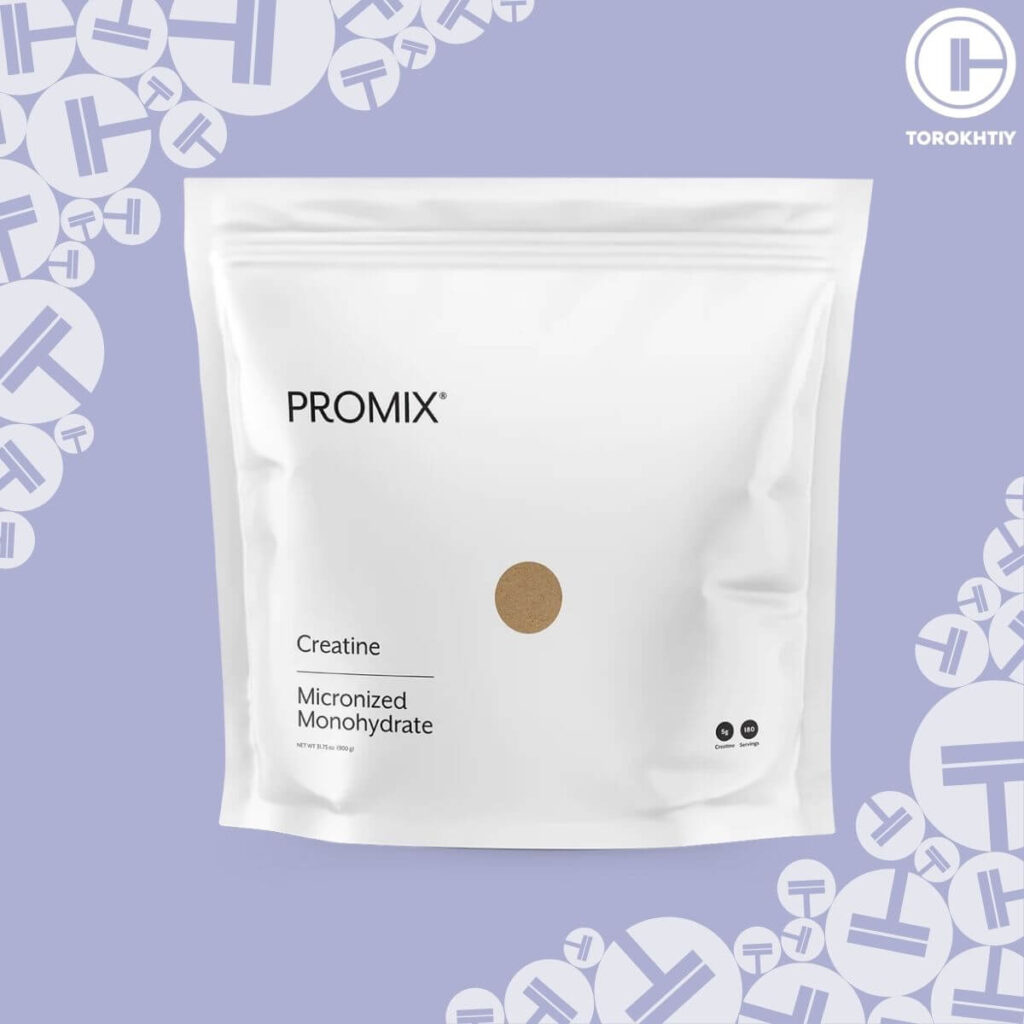


Still have questions after reading our article? Unlock your full potential by engaging with our experts and community! Don’t hesitate — leave a comment below and Oleksandr Maksymenko will provide a personalized answer and insights to help you reach your goals.